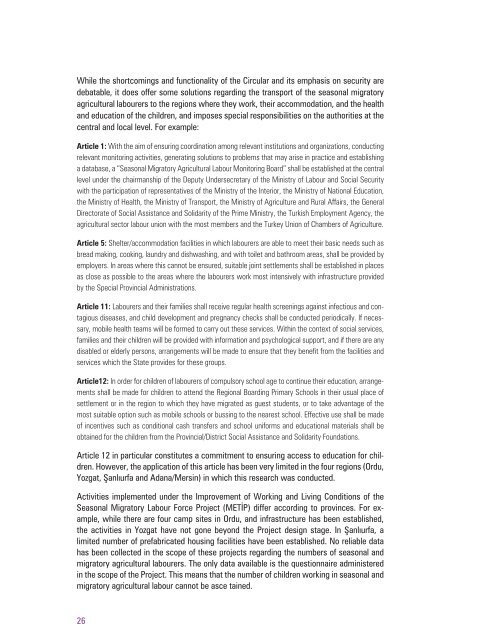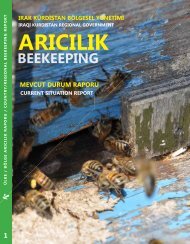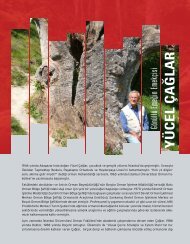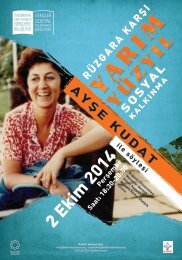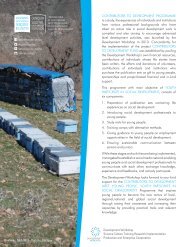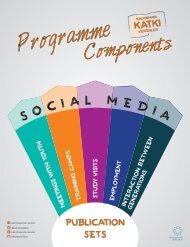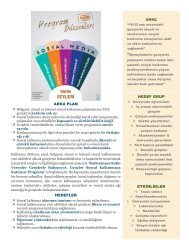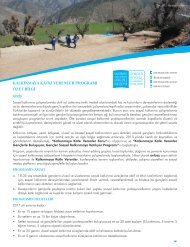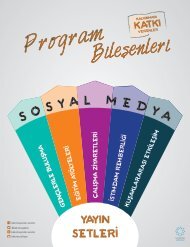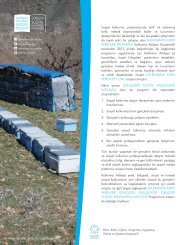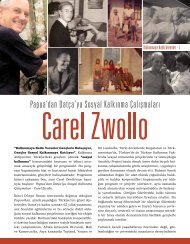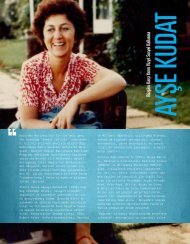You also want an ePaper? Increase the reach of your titles
YUMPU automatically turns print PDFs into web optimized ePapers that Google loves.
While the shortcomings and functionality of the Circular and its emphasis on security are<br />
debatable, it does offer some solutions regarding the transport of the seasonal migratory<br />
agricultural labourers to the regions where they work, their accommodation, and the health<br />
and education of the children, and imposes special responsibilities on the authorities at the<br />
central and local level. For example:<br />
Article 1: With the aim of ensuring coordination among relevant institutions and organizations, conducting<br />
relevant monitoring activities, generating solutions to problems that may arise in practice and establishing<br />
a database, a “Seasonal Migratory Agricultural Labour Monitoring Board” shall be established at the central<br />
level under the chairmanship of the Deputy Undersecretary of the Ministry of Labour and Social Security<br />
with the participation of representatives of the Ministry of the Interior, the Ministry of National Education,<br />
the Ministry of Health, the Ministry of Transport, the Ministry of Agriculture and Rural Affairs, the General<br />
Directorate of Social Assistance and Solidarity of the Prime Ministry, the Turkish Employment Agency, the<br />
agricultural sector labour union with the most members and the Turkey Union of Chambers of Agriculture.<br />
Article 5: Shelter/accommodation facilities in which labourers are able to meet their basic needs such as<br />
bread making, cooking, laundry and dishwashing, and with toilet and bathroom areas, shall be provided by<br />
employers. In areas where this cannot be ensured, suitable joint settlements shall be established in places<br />
as close as possible to the areas where the labourers work most intensively with infrastructure provided<br />
by the Special Provincial Administrations.<br />
Article 11: Labourers and their families shall receive regular health screenings against infectious and contagious<br />
diseases, and child development and pregnancy checks shall be conducted periodically. If necessary,<br />
mobile health teams will be formed to carry out these services. Within the context of social services,<br />
families and their children will be provided with information and psychological support, and if there are any<br />
disabled or elderly persons, arrangements will be made to ensure that they benefit from the facilities and<br />
services which the State provides for these groups.<br />
Article12: In order for children of labourers of compulsory school age to continue their education, arrangements<br />
shall be made for children to attend the Regional Boarding Primary Schools in their usual place of<br />
settlement or in the region to which they have migrated as guest students, or to take advantage of the<br />
most suitable option such as mobile schools or bussing to the nearest school. Effective use shall be made<br />
of incentives such as conditional cash transfers and school uniforms and educational materials shall be<br />
obtained for the children from the Provincial/District Social Assistance and Solidarity Foundations.<br />
Article 12 in particular constitutes a commitment to ensuring access to education for children.<br />
However, the application of this article has been very limited in the four regions (Ordu,<br />
Yozgat, Şanlıurfa and Adana/Mersin) in which this research was conducted.<br />
Activities implemented under the Improvement of Working and Living Conditions of the<br />
Seasonal Migratory Labour Force Project (METİP) differ according to provinces. For example,<br />
while there are four camp sites in Ordu, and infrastructure has been established,<br />
the activities in Yozgat have not gone beyond the Project design stage. In Şanlıurfa, a<br />
limited number of prefabricated housing facilities have been established. No reliable data<br />
has been collected in the scope of these projects regarding the numbers of seasonal and<br />
migratory agricultural labourers. The only data available is the questionnaire administered<br />
in the scope of the Project. This means that the number of children working in seasonal and<br />
migratory agricultural labour cannot be asce tained.<br />
26


